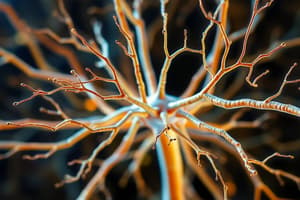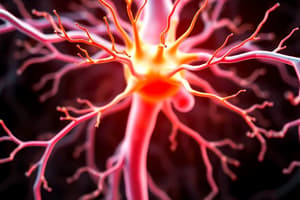Podcast
Questions and Answers
What are some common neurotransmitters mentioned in the text?
What are some common neurotransmitters mentioned in the text?
Acetylcholine, serotonin, dopamine, norepinephrine, and glutamate
How do hormones regulate physiological processes in the body?
How do hormones regulate physiological processes in the body?
Hormones are released into the bloodstream and travel to target cells, where they bind to specific receptors and trigger specific responses.
Explain the interaction between the nervous system and neurotransmitters when a sensory neuron detects a change in the environment.
Explain the interaction between the nervous system and neurotransmitters when a sensory neuron detects a change in the environment.
The sensory neuron sends a signal to the CNS, which processes the information and sends a response signal to the appropriate motor neuron. The motor neuron then releases neurotransmitters, such as acetylcholine, which bind to receptors on the muscle fiber, causing it to contract.
How do hormones influence the release of neurotransmitters and affect mood and behavior?
How do hormones influence the release of neurotransmitters and affect mood and behavior?
Why is the interaction of the nervous system, neurotransmitters, and hormonal control essential for the proper functioning of the organism?
Why is the interaction of the nervous system, neurotransmitters, and hormonal control essential for the proper functioning of the organism?
What are the two main components of the nervous system?
What are the two main components of the nervous system?
What is the function of neurotransmitters?
What is the function of neurotransmitters?
How does the nervous system contribute to control and coordination?
How does the nervous system contribute to control and coordination?
What is the role of the peripheral nervous system (PNS) in the body?
What is the role of the peripheral nervous system (PNS) in the body?
Where are neurotransmitters released from and where do they bind?
Where are neurotransmitters released from and where do they bind?
Flashcards are hidden until you start studying
Study Notes
Control and Coordination: Understanding the Nervous System, Neurotransmitters, and Hormonal Control
Control and coordination are essential processes that enable living organisms to function effectively. These processes involve the interaction of various systems, including the nervous system, neurotransmitters, and hormonal control. In this article, we will delve into these subtopics, providing an in-depth understanding of their roles in control and coordination.
Nervous System
The nervous system is a complex network of cells, tissues, and organs that communicates information between different parts of the body. It consists of the central nervous system (CNS) and the peripheral nervous system (PNS). The CNS includes the brain and spinal cord, while the PNS is responsible for transmitting signals from the CNS to the rest of the body and vice versa. The nervous system plays a crucial role in control and coordination by processing sensory information and initiating appropriate responses.
Neurotransmitters
Neurotransmitters are chemical messengers that facilitate communication between nerve cells. They are released from the presynaptic nerve terminal at the end of the axon into the synapse, where they bind to receptors on the postsynaptic neuron. Neurotransmitters are involved in various functions, such as muscle movement, mood regulation, and learning and memory. Some common neurotransmitters include acetylcholine, serotonin, dopamine, norepinephrine, and glutamate.
Hormonal Control
Hormones are chemical messengers produced by endocrine glands that regulate various physiological processes in the body. They are released into the bloodstream and travel to target cells, where they bind to specific receptors and trigger specific responses. Hormonal control plays a crucial role in coordinating various bodily functions, such as growth and development, metabolism, and stress response.
Interactions Between Nervous System, Neurotransmitters, and Hormonal Control
The nervous system, neurotransmitters, and hormonal control systems work together to maintain control and coordination in the body. For example, when a sensory neuron detects a change in the environment, it sends a signal to the CNS. The CNS processes this information and sends a response signal to the appropriate motor neuron. The motor neuron then releases neurotransmitters, such as acetylcholine, which bind to receptors on the muscle fiber, causing it to contract.
Hormonal control also interacts with the nervous system and neurotransmitters in various ways. For instance, certain hormones, such as cortisol, can modulate the release of neurotransmitters, affecting mood and behavior. Additionally, hormones can influence the growth and maintenance of synapses, which are the sites where neurotransmitters are released.
In conclusion, control and coordination are essential processes that involve the interaction of the nervous system, neurotransmitters, and hormonal control. These systems work together to facilitate communication, coordination, and regulation of various bodily functions, ensuring the proper functioning of the organism.
Studying That Suits You
Use AI to generate personalized quizzes and flashcards to suit your learning preferences.




